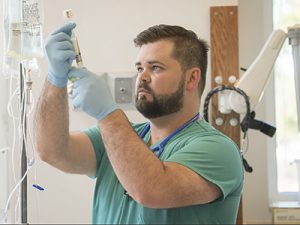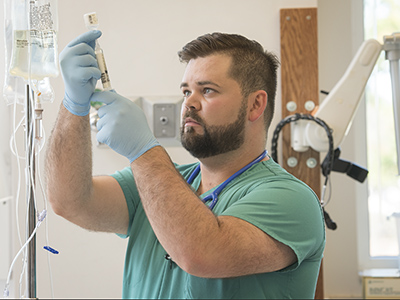By: Daniel H. Gouger, MD
 The morning of my medical school graduation, I woke up early to steam my academic regalia. Then I wrote a public statement about how repealing the Affordable Care Act would devastate millions. In months of scorching D.C. summer heat, I met with elected officials’ offices and called Congressional phone lines, sent straight to voicemail. I fought alongside people pleading for their lives and health care coverage. I watched people in wheelchairs get carted out of the U.S. Senate building.
The morning of my medical school graduation, I woke up early to steam my academic regalia. Then I wrote a public statement about how repealing the Affordable Care Act would devastate millions. In months of scorching D.C. summer heat, I met with elected officials’ offices and called Congressional phone lines, sent straight to voicemail. I fought alongside people pleading for their lives and health care coverage. I watched people in wheelchairs get carted out of the U.S. Senate building.
A year later, I’ve taught thousands of medical trainees around the United States. I’ve examined dozens of health policy issues. As the AMSA Education and Advocacy Fellow, I’ve learned many things that medical school does not teach. Or doesn’t teach well, at least. Here are five things I’ve come across that deserve pause:
1. The history of health insurance, health care delivery, organized medicine, and medical education are all intimately connected. But your trainee voice can stand alone.
Ask yourself why the United States’ health care delivery system is so fragmented. Study iconic texts like Paul Starr’s The Social Transformation of American Medicine. Read the Flexner Report of 1910 and the century-later analyses of the ramifications Abraham Flexner’s medical education reform has had on the medical education system, especially historically black medical schools. The path to becoming a physician truly should be an early lesson in privilege, power, and difference.
Each of these, alongside the history of AMSA, discuss important reasons of how organized medicine has influenced medical education and the health care system during political moments. By breaking away from the American Medical Association in 1967 and embracing core values of health care for all and civil rights, AMSA became an important, independent platform for medical trainees to engage civically without filters or fear of patriarchal silencing.
2. Analyze systems, not just symptoms.
Physician dedication to public health and social change are nothing new. This is despite a lack of their widespread attention until the latter half of the 20th Century.
At just 28 years old, Rudolf Virchow, MD, in 1848 wrote in his Medical Reform Newspaper, “Medicine is a social science, and politics is nothing but medicine on a large scale. The physicians are the natural attorneys of the poor, and social problems should largely be resolved by them.” Know that systems of power are intersectional. Challenge those systems for health justice because they influence your patients’ health far more than just disease processes.
3. As a physician, be your patients’ person– not just their health care provider.
Natural disasters are mother nature’s climaxes. In the aftermath, they also throw back the curtains on public health’s most vulnerable, yet invisible people.
I was struck earlier in the year by this in the Bay Area and East Oakland, where I studied medical education, public health, and health policy with both Kaiser Permanente’s Northern California Residency Programs and George Washington University. Here’s what I wrote from pieces of my journal after a day of anesthesiology cases:
A charred smell leached through the bowels of the hospital into the operating rooms. I heard stories of both patients and co-workers losing their homes. It was only a few hours after wildfires whipped across Northern California wine country. While scientists and politicians battled over climate change ‘legitimacy,’ today I wondered what people’s lives would be like in the burnt aftermath and devastation. I spoke with a physician who worked overnight at a shelter. She told me the most disturbing part was an uncomfortable silence that draped the room— ‘no news, no texts or cell phone lights, and I even brought my lamp from home so I could examine patients.’
Throughout the year, I have worked with Kaiser Permanente to design supplemental curriculum for their Latino Health Elective. Our patients need people, not just diagnosticians and treatment planners. We learn to seek the patient’s perspective of their illness, but we must also know how their experience as members of their communities in the larger health care delivery system differs from others. And when that experience is unjust, we must rectify it.
4. Students are drivers of change.
The students at Marjory Stoneman Douglas High School with their gun safety activism resoundingly demonstrate that youth are change agents. In March, I lead hundreds of AMSA medical trainees from 25 states plus international regions to Capitol Hill for our Annual Advocacy Day in Washington, D.C. I also was on the Program Planning Committee for the 2018 Sex and Gender Health Education Summit in Salt Lake City, Utah. We taught and discussed how sex and gender are addressed in health professions education and showed how medical trainees often lead the way in education reform.
Whether it was through teaching and education programs, direct action and grassroots advocacy efforts, or grasstops initiatives in legislative affairs and government relations, here are examples of other issues I’ve worked on this year:
- Increasing access to care through Medicare, Medicaid, the ACA, and single payer health insurance
- Promoting health equity for minority populations with ongoing support of the Health Equity and Accountability Act
- Reinforcing the importance of public health programs for natural disasters and emergency relief
- Advocating for continuation of DACA and anti-discrimination protections immigrants
- Supporting student loan interest tax deductions
- Addressing substance use and resiliency in medical school and residency
- Opposing expansion of state child abuse laws that would vilify pregnant mothers whose fetuses were exposed to substances in utero by dooming them to poverty and social isolation
- Supporting pharmaceutical company accountability measures and penalties for their contributions to exacerbating the opioid epidemic
- Supporting gender confirmation surgery in the Veterans Health Administration
- Examining how health professions teach global antimicrobial resistance and stewardship
- Ensuring civil rights protections for contraception and family planning
- Supporting anti-discrimination protections for the LGBTQI communities
- Addressing gun violence as a public health crisis and matter of national safety
- Supporting funding for Federally Qualified Health Centers, the National Health Services Corps, the Indian Health Services Corps, Teaching Health Centers for Graduate Medical Education and other physician and health professionals workforce development programs
- Reauthorization of the Higher Education Act with provisions for GradPLUS loans, income driven repayment programs, and Public Service Loan Forgiveness
5. Invest in your peers as much as you do your patients.
My best friend who’s an Emergency Medicine resident told me about her intern orientation lecture on resilience in residency. It started out by an attending proclaiming the experience was not Nazi Germany in the Holocaust. They would survive. In other words, you are not being waterboarded or starved, so deal with it and do not complain.
In medicine, we experience unavoidable vicarious trauma. That should not be further fueled by an educational system that continues its tradition of trainee dehumanization, and abuse. Study how adults learn, and then learn to teach. Reflect on what makes you human, and then learn to rejuvenate your peers.
I am the first physician in my family and was raised by a single mom in rural Appalachia after my father passed away from a congenital heart defect when I was a teen. As AMSA members, no matter what the medical education and health care system is like, you’ll be a part of the movement that changes it because you changed me as a clinician and educator. And you continue to change each other.
The first physician in his family and an aspiring medical educator and writer, Daniel H. Gouger, MD, is a new resident physician in the Department of Anesthesiology at VCU Health. Prior to residency, he was the American Medical Student Association (AMSA) Education and Advocacy Fellow 2017-2018 in Washington, D.C., sponsored by Kaiser Permanente Northern California Residency Programs.
Dr. Gouger is an alumnus of East Tennessee State University (ETSU) Quillen College of Medicine, where he has been regularly invited back as a guest instructor. He holds a graduate specialization from ETSU in Spanish Healthcare Interpretation and Translation, and frequently works in Latino health. Throughout his clinical training, he has served on committees for medical education curriculum review. He served multiple years on the Board of Directors for a 501(c)3 clinic in Tennessee specializing in holistic and evidence-based treatment of opioid addicted pregnant women.
Prior to medical school, Dr. Gouger received a Fulbright Research Fellowship in Spain, which he completed in Barcelona. He worked in both medicinal chemistry research and in immigrant outreach and cross-cultural education programming for the Office of the US Consulate General. His drug design research focused on the peptidomimetic synthesis of novel antiviral therapies for Hepatitis C Virus. He graduated from the MTSU University Honors College with a Bachelor of Science in Biochemistry and Bachelor of Arts in Spanish Language and Literature. He completed minors in Biology, Business Administration, and Leadership Studies. At MTSU, he was an honors college laboratory teaching assistant, as well as worked at the MTSU Career Development Center as a peer career advisor, the Student Athlete Enhancement Center, and with the Office of Education Abroad. He was recognized by the MTSU Vice-Provost for International Affairs as the student who had done the most to personify a “Global Student Citizen.”
His current interests lie in advancing the social mission of medicine through health justice and public policy, leadership and professional development, and adult learning in medical education. As an educator, he is deeply committed to mentoring and hopes that current and future physicians invest as much in each other as they do their patients. To that end, he believes that learners can be expected to succeed or fail, and either way they likely prove it true.

